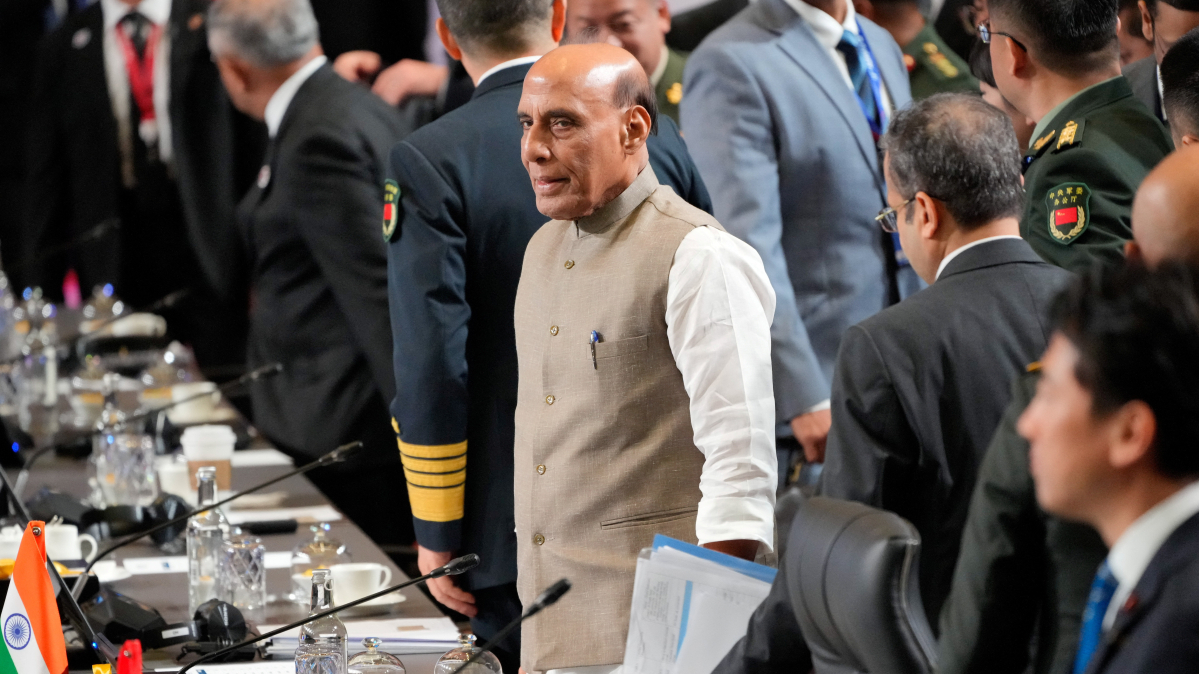Ukraine's Zelenskyy says ‘more readiness’ for next trilateral meeting, as Geneva talks conclude
U.S.-mediated talks on the Russia–Ukraine war concluded in Geneva on Thursday, with Ukrainian President Volodymyr Zelenskyy describing the outcome a...
Pakistan issued a strong rebuke after India’s Defence Minister Rajnath Singh suggested that Sindh, currently a province of Pakistan, could one day return to India. Singh framed the idea as part of a civilisational link, saying borders can change and past separations may not be permanent.
His remarks referenced the displacement of Sindhi Hindus during Partition. He spoke of visiting families who had settled in Delhi and described efforts to secure their citizenship. He also cited former deputy prime minister Lal Krishna Advani, noting that many Sindhi Hindus never fully accepted the division of their homeland.

Pakistan’s Foreign Office responded with a formal statement describing Singh’s remarks as delusional and revisionist.
Officials said the comments reflected an expansionist Hindutva mindset and challenged recognised borders under international law. Islamabad warned that such rhetoric threatens regional peace and stability.
The statement urged Indian leaders to focus on the protection of minorities inside India. It cited concerns about discrimination, historical distortions, and cycles of identity-based violence affecting various communities across the country. It also referenced long-standing grievances in India’s northeast, where marginalisation has been a persistent issue.
Pakistan also called on India to take credible steps toward resolving the Jammu and Kashmir dispute in line with UN Security Council resolutions.
Islamabad reiterated that the aspirations of Kashmiris remain central to any settlement. The statement closed with a commitment to peaceful dispute resolution and an affirmation of Pakistan’s determination to safeguard its sovereignty and national independence.
Singh’s remarks pulled history back into the present, blurring the line between cultural memory and modern borders.
The reaction from Islamabad highlights how historical narratives continue to influence diplomatic relations in South Asia. The coming days will show whether the exchange shifts into a wider political dispute or fades as another brief flashpoint in the region’s long and contested landscape.
The death toll from heavy rains and flooding in Brazil’s Minas Gerais state has risen to 46, authorities said, with 21 people still reported missing. The storms triggered landslides and widespread flooding, displacing thousands across Juiz de Fora and Uba.
The U.S. Embassy in Jerusalem says it will provide on-site passport and consular services to settlers based in the West Bank on Friday 27 February. The move marks the first time American consular officials have offered such services to settlers, U.S. officials said on Tuesday.
UK police have concluded searches at Andrew Mountbatten-Windsor’s former residence in Windsor Great Park as part of an investigation into alleged misconduct in public office.
The situation in Cuba was heating up and called for restraint following a deadly incident involving a Florida-registered speedboat off the coast of the Caribbean island, the Kremlin said on Thursday (26 February).
A group of sick and injured Palestinians and their caregivers left Gaza through the Rafah border crossing on Wednesday (25 February) for medical treatment abroad, as limited evacuations continue under tight restrictions.
China’s military said on Friday it had conducted a routine patrol in the South China Sea from 23 to 26 February, accusing the Philippines of “disrupting” regional peace and stability by organising joint patrols with countries outside the region.
Russian Foreign Ministry spokeswoman Maria Zakharova on Thursday (26 February) accused Ukraine of threatening Europe’s energy security by halting oil flows through the Druzhba oil pipeline to Hungary and Slovakia.
U.S.-mediated talks on the Russia–Ukraine war concluded in Geneva on Thursday, with Ukrainian President Volodymyr Zelenskyy describing the outcome as showing “more readiness” for further trilateral diplomacy covering security, economic and political elements of a potential settlement.In his nightly
Iran’s top diplomat said that the next round of nuclear talks is expected in less than a week after what he described as “progress in the most serious exchanges” between Tehran and Washington. The statement follows the third round of nuclear talks on Thursday (26 February) in Geneva.
Mexico’s President Claudia Sheinbaum on Thursday thanked FIFA and its President, Gianni Infantino, for reaffirming that the country’s 2026 World Cup host venues will remain unchanged, following violence that erupted after the killing of a major cartel leader.
You can download the AnewZ application from Play Store and the App Store.

What is your opinion on this topic?
Leave the first comment